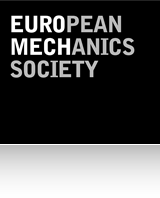Objectives of the Society
The objective of the Society is to engage in all activities intended to promote in Europe the development of mechanics as a branch of science and engineering.
Mechanics deals with motion, flow and deformation of matter, be it fluid solid, under the action of applied forces, and with any associated phenomena.
In particular, the Society will pursue this objective through:
- the organisation of European meetings on subjects within the entire field of mechanics;
- the establishment of links between persons and organisations including industry engaged in scientific work in mechanics and in related sciences;
- the gathering and dissemination of information on all matters related to mechanics;
- the development of standards for education in mechanics and in related sciences throughout Europe.
These activities which transcend national boundaries are to complement national activities.
The Society welcomes to membership in the Society all those who are interested in the advancement and diffusion of mechanics. It also bestows honorary membership, prizes and awards to recognise scientists who have made exceptionally important and distinguished contributions.
Members may take advantage of benefits such as reduced registration fees to our meetings, reduced subscription to European Journal of Mechanics, information on meetings, job offers and other matters in mechanics. Less tangibly but perhaps even more important, membership provides an opportunity for professional identification and for helping to shape the future of our science in Europe and make it attractive to young people.
